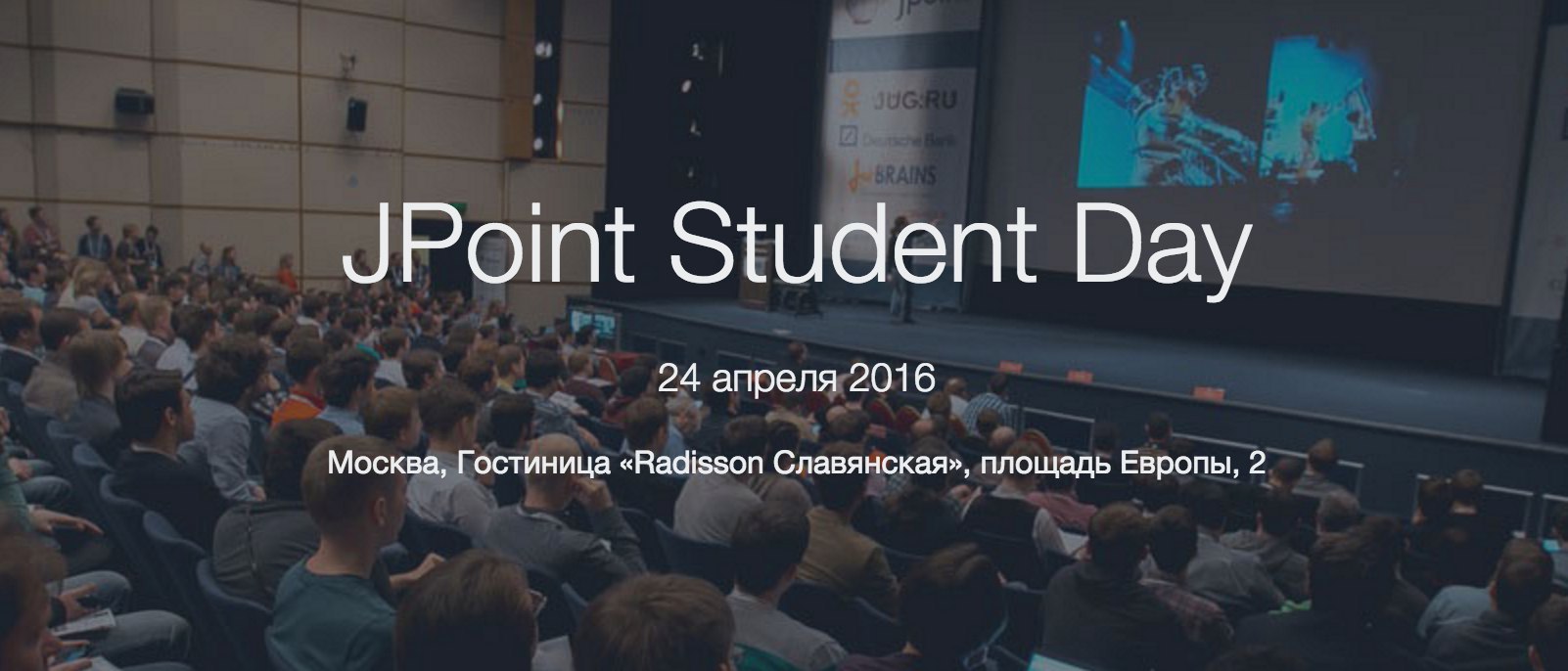FAQ on Java-conference for students in Moscow

Recently, we have received a lot of requests on JPoint 2016 Student Day - a Java conference for students, which we will hold in Moscow next Sunday, April 24th.
Among the most frequently asked questions are the following:
- Why do we do student conferences?
- Where did the age limit for participants come from - 25 years?
- How does a conference differ from an “adult” JPoint?
- Will there be an online broadcast?
')
In this post I will try to dot the i's and explain what's what.
What? Where? When?
- JPoint 2016 Student Day student conference;
- 18 technical reports on Java technology;
- Moscow, hotel "Radisson Slavyanskaya";
- April 24th, Sunday.
What are the reports about?
All topics are about the same as in the large JPoint, but in the Lite version:
- JVM internals
- introduction to distributed systems;
- who is baytkod and what they eat it with;
- ORM (JPA, Hibernate);
- multithreaded programming;
- Kotlin;
- Reactive programming;
- Refactoring.
And there will be a report from the student ! Roman Artemyev, a student of the 6th year of the Physics Department of the NSU, will talk about how they and their Unipro colleagues make Java for the Elbrus processor. And this is a bomb.
Despite the fact that Roman is the youngest of our speakers, the report promises to be the most hardcore at the conference. Judge for yourself, Roman will tell about:
- architecture features of Elbrus and fundamental differences from x86;
- porting the Zero interpreter from OpenJDK and implementing the compiler LLVM backend for Elbrus;
- development of a VLIW code generator capable of operating under JIT compiler conditions;
- "Splicing" of the code generator and the Opto compiler;
- exception handling;
- implicit array bounds checking
As a result, students will learn about the approaches and non-trivial solutions that were used when porting the JVM to an "exotic" architecture, how the use of seemingly minor architectural features can give much more acceleration than various classical optimizations, and also why Elbrus is said to be slow, and as far as true.

By the way, we wanted to bring a live Elbrus to the conference, but it was not very easy to agree on this. Hope to succeed next time.
What is the difference between the JPoint 2016 Student Day and the big JPoint?
Firstly, the student day program is greatly facilitated compared to the “adult” JPoint. And this is understandable, because complex technical reports, which are met in abundance at a large conference, simply will not reach the student audience. Therefore, speakers adapt their reports specifically for young people.
Who is this conference for?
First, for young people who are interested in Java technology. Students, schoolchildren, students of technical schools are all who are young and who are interested in what is happening in the Java world and the world of other JVM languages.
Secondly, for teachers . Yes, we invite Java teachers to participate in the conference. In the questionnaire you need to indicate that you are a Java teacher and write where you teach. We invite teachers to participate so that you look at what is happening in the Java world now and can somehow adjust your approach and course programs according to what you see.
What a stupid age limit on participation - 25 years?
The conference is designed for a young audience, and this is where the restriction came from. If you are older, then welcome to the JPoint for adults .
However, if you are older, but a student - write to me in a personal, and most likely, we will let you in too.
Who are the sponsors?
This time we have one sponsor - Odnoklassniki. Classmates traditionally support all of our conferences, and we are madly grateful for that. The main technical directions that Odnoklassniki currently has are high-load server programming in Java (thousands of servers Java SE, Spring, Tomcat, one-nio, Cassandra), mobile development (iOS, Android) and Data Science (Apache Hadoop, Spark, Tez , Pig, Hive).
Classmates will look for interns in Moscow and St. Petersburg offices.

Will there be an online broadcast?
There will be no broadcast, but there will be a video recording. A couple of months after the conference, we will publish all the videos on our Youtube channel .
Why come if there is still a video?
Because the conference is not just reports. JPoint 2016 Student Day is also:
- the opportunity to communicate with people from other universities, cities and even countries about what is happening with learning programming and Java in particular;
- the opportunity to ask any questions of Java development gurus from Russia, Estonia, Switzerland, Israel and the USA;
- get an internship to the speakers (many of them have vacancies for interns in the companies) and our sponsors (see above).

So, once again we invite everyone who is young and who is interested in Java-technology for the JPoint student day. Event website: http://students.javapoint.ru/
Friends, if you yourself are too old for such an event, but you have friends of senior schoolchildren and students interested in programming, be sure to send them a link to the conference. I am sure it will be very useful to many of them.
Source: https://habr.com/ru/post/281416/
All Articles